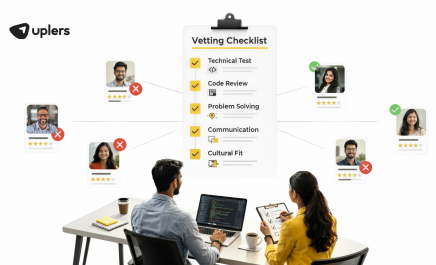Why Hiring Azure Developers can Future-Proof Your SaaS Infrastructure
- Kritika Verma
- May 30, 2025
- 5 Minute Read

The global cloud revenue is growing continuously, and between 2024 and 2029, it is projected to increase by a total of 1 trillion U.S. dollars. Cloud computing delivers flexible solutions with accessible and economical features, yet its expansion can pressure companies’ infrastructure. SaaS providers must fulfill increasing user expectations, security benchmarks, and privacy regulations.
Microsoft Azure excels with adjustable, scalable options for addressing these issues. Hiring Azure developers enables companies to maximize Azure’s capabilities, enhance processes, and foster innovation.
This blog discusses why SaaS firms opt for hiring Azure Developers, key competencies, and the creation of strong multi-tenant solutions on the platform.
Understanding Microsoft Azure for SaaS
Microsoft Azure is a leading cloud platform that offers over 200 services, including virtual servers, data storage, and advanced analytics tools. The reason why SaaS companies choose Azure is evident: it provides a vast array of cloud-native tools such as:
- Azure Kubernetes Service (AKS): For managing container orchestration and microservices.
- Azure SQL Database: Completely managed relational database solution.
- Azure Active Directory (AAD): Management of identities and access.
- Azure App Services: A platform for hosting web applications, REST APIs, and mobile back-end services.
The Role of Azure Developers in SaaS Growth

Hiring Azure developers enables SaaS firms to expand their offerings. These experts focus on creating, implementing, and overseeing solutions in the Azure ecosystem.
Azure developers have extensive expertise in:
- Azure Resource Manager (ARM)
- Bicep/Terraform for code-based infrastructure
- Azure DevOps for ongoing integration and delivery
- Identity services utilizing Azure AD
- Strategies for managing costs and automation
In contrast to typical cloud developers, Azure developers understand the complexities of Microsoft’s ecosystem. Their expertise allows organizations to utilize Azure effectively and customize solutions for achievement in the SaaS sector.
Benefits of Hiring Azure Developers for SaaS Companies
When you hire Azure Developers, it introduces transparency, management, and creativity to your SaaS framework. They assist you in growing quickly, enhancing security, and developing intelligently, ensuring your platform remains competitive:
- Scalability: Azure developers use the Azure Load Balancer and AKS to create systems that handle regional expansion and traffic spikes seamlessly.
- Security & Compliance: They combine Azure Policy, Security Center, and Microsoft Defender to adhere to HIPAA, GDPR, and ISO/IEC regulations.
- Market Acceleration: Developers can automate their delivery pipelines, making it quicker and simpler to release updates and test new features.
- Integration Features: They link your SaaS solution with Microsoft 365, Dynamics 365, and Power Platform, helping to improve functionality.
- Cost Efficiency: Through autoscaling, reserved instances, and tagging, developers minimize waste and help control expenditures, particularly in multi-tenant SaaS on Azure.
How Azure Developers Help Future-Proof Your SaaS Infrastructure
Sustainable growth depends heavily on design principles. Azure developers help future-proof the SaaS infrastructure through these implementation strategies:
- Modular Design: The use of containers and AKS for microservices development enables better service isolation and faster feature development.
- Multi-cloud and Hybrid Cloud Readiness: With Azure Arc, developers can run apps smoothly across both cloud and on-premises environments.
- Business Continuity and Disaster Recovery: Operational processes are maintained during catastrophic failures. This is due to geo-redundancy, backup, and high availability zones.
- Continuously Integrated Development and Deployment Pipelines: Testing and code validation automation enables innovation at every step.
- Artificial Intelligence and Machine Learning: With Azure Cognitive Services, developers can easily add smart features like speech recognition, language understanding, text reading (OCR), and app translation.
Real-World Use Cases & Success Stories

Take Adobe, for example, which uses Azure to manage the Creative Cloud SaaS services for millions of users globally. Similarly, GE Healthcare uses Azure for hosting their medical imaging SaaS application under stringent HIPAA compliance.
These success stories demonstrate how firms in FinTech, HealthTech, and EdTech are gaining advantages from the Azure ecosystem, showing its enduring worth.
Key Considerations When Hiring Azure Developers
Before making hiring decisions, companies need to determine if they will employ in-house resources, outsource, or collaborate with managed Azure service providers. Every choice involves compromises regarding control, expense, and scalability.
Essential qualifications to consider encompass:
- Microsoft certified Azure Developer Associate (AZ-204)
- Knowledge of containerization and Infrastructure as Code tools
- Azure DevOps Engineer Specialist (AZ-400)
- Familiarity with Azure CLI, PowerShell, and ARM Templates
Evaluation should encompass problem-solving situations such as launching a scalable web application or configuring CI/CD with approval checkpoints. Hire remote azure developers will help you in onboarding top talent without geographical restrictions and also presents an opportunity in saving thousands of dollars. There are various advantages if you hire talents remotely. Uplers have an amazing talent network og 3M+ talents who all are ready to serve you dedicated and quality services.
Challenges and How to Overcome Them
Even with Azure’s capabilities, businesses might encounter difficulties:
- Legacy Integrations: Azure developers can use hybrid connectors and Logic Apps to update outdated systems progressively.
- Handling Multi-tenant Architecture: By dividing tenants into distinct resource groups and using RBAC, developers can enhance manageability and mitigate risks.
- Cost Overruns: Azure Cost Management and Azure Advisor assist in tracking expenses and recommending improvements.
Employing Azure developer skills for SaaS success guarantees that these issues are addressed using best practices and with minimal impact on business operations.
Future Trends in SaaS Development With Azure
Azure is continually developing. Developers will increasingly depend on:
- Serverless and FaaS (Function-as-a-Service) utilizing Azure Functions to minimize infrastructure management.
- Low-code/no-code solutions with Power Platform to make development accessible to all.
- Azure Stack for latency-sensitive applications in edge computing.
- AI-augmented SaaS utilizing Azure Machine Learning to provide more intelligent, flexible applications.
- Firms that monitor these trends will remain competitive and accelerate innovation.
Bottom Line
As SaaS platforms expand, their infrastructure must be secure and flexible. Hiring Azure developers gives your business the necessary skills to meet growing demand. It also ensures steady performance and efficiently controls expenses.
The experts understand how to get the most out of Azure by developing multi-tenant systems and automating deployments and data security. Their expertise, which aligns with key Azure developer skills for SaaS success, helps improve processes and cultivate continuous improvements.
Frequently Asked Questions
What does an Azure developer do in a SaaS environment?
Ans: An Azure developer builds, manages, and improves cloud-native apps on Azure. Their prime focus is on making the apps scalable, secure, and cost-effective.
Is Microsoft Azure suitable for small SaaS startups?
Ans: Yes. Azure provides pay-as-you-go options and a complimentary tier. This makes it suitable for startups seeking enterprise-grade capabilities at an affordable price.
How much does it cost to hire an Azure developer?
Ans: It varies depending on experience and location, but certified Azure developers average between $60 and $120 an hour.
Can Azure help improve the security of SaaS applications?
Ans: Yes. Azure provides advanced tools such as Security Center, Sentinel, and integrated compliance solutions to improve security.
What is the difference between AWS and Azure for SaaS infrastructure?
Ans: Both are strong, but Azure integrates more closely with Microsoft tools. Azure is mostly used in a hybrid cloud environment, when it offers several Saas features. When it comes to AWS, it provides flexibility for those who work on open source technologies.






